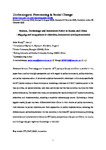Science, technology and innovation policy in Russia and China – Mapping and comparisons in objectives, instruments and implementation
| dc.contributor.author | Wang, Peijie | |
| dc.contributor.author | Li, F | |
| dc.date.accessioned | 2020-12-16T19:03:46Z | |
| dc.date.available | 2020-12-16T19:03:46Z | |
| dc.date.issued | 2021-01 | |
| dc.identifier.issn | 0040-1625 | |
| dc.identifier.other | 120386 | |
| dc.identifier.uri | http://hdl.handle.net/10026.1/16751 | |
| dc.description.abstract |
Science, Technology and Innovation (STI) policy of Russia and China is studied in this paper from a policy foresight perspective and with regard to policy instruments, policy objectives, and policy implementation. A structural analytical framework is developed in this study specifically for STI policy analysis in these dimensions. Analyzing a database of 418 STI policies issued in the two countries, 25 policy variables have been scrutinized for the two countries vis-à-vis the three policy dimensions. The paper then maps and compares the two countries in STI policy instruments, objectives and implementation, adopting a positivist epistemology stance. Estimating a binary logistic model, Russia has been differentiated from China in their choice of policy instruments, their devotion to policy objectives and their approaches to policy implementation, revealing the differences and similarities between the two countries in the three STI policy dimensions. Deriving observable and corroborated evidence for STI policy perspectives in Russia and China, the results and findings help gain legitimate knowledge in this field. | |
| dc.format.extent | 120386-120386 | |
| dc.language | en | |
| dc.language.iso | en | |
| dc.publisher | Elsevier BV | |
| dc.subject | Sexually Transmitted Infections | |
| dc.title | Science, technology and innovation policy in Russia and China – Mapping and comparisons in objectives, instruments and implementation | |
| dc.type | journal-article | |
| dc.type | Journal Article | |
| plymouth.issue | 0 | |
| plymouth.volume | 162 | |
| plymouth.publication-status | Published | |
| plymouth.journal | Technological Forecasting and Social Change | |
| dc.identifier.doi | 10.1016/j.techfore.2020.120386 | |
| plymouth.organisational-group | /Plymouth | |
| plymouth.organisational-group | /Plymouth/Faculty of Arts, Humanities and Business | |
| plymouth.organisational-group | /Plymouth/Faculty of Arts, Humanities and Business/Plymouth Business School | |
| plymouth.organisational-group | /Plymouth/REF 2021 Researchers by UoA | |
| plymouth.organisational-group | /Plymouth/REF 2021 Researchers by UoA/UoA17 Business and Management Studies | |
| plymouth.organisational-group | /Plymouth/Users by role | |
| plymouth.organisational-group | /Plymouth/Users by role/Academics | |
| dcterms.dateAccepted | 2020-10-02 | |
| dc.rights.embargodate | 2022-4-22 | |
| dc.rights.embargoperiod | Not known | |
| rioxxterms.versionofrecord | 10.1016/j.techfore.2020.120386 | |
| rioxxterms.licenseref.uri | http://www.rioxx.net/licenses/all-rights-reserved | |
| rioxxterms.licenseref.startdate | 2021-01 | |
| rioxxterms.type | Journal Article/Review |


